
![]()
Board Chair of the Future
At the Global Governance Summit held Sept. 19 at the Marriott Hotel, Kirsten Patterson, chair of the Global Network of Directors, made a comprehensive and insightful presentation about the evolving role of the board chair of the future. The role of “the first amongst equals,” she said, is now more complex and demanding amid the rapid global landscape changes, digital transformation, cybersecurity risks, climate issues, and geopolitical uncertainties.
She also presented some current top issues for directors in New Zealand, which are similar challenges faced in the Philippines, such as climate change. It is a reality as we can now feel the extreme heat and heavy flooding, with the Philippines being a disaster-prone country. Another issue is future-ready succession and leadership transition, as every company should be ready for this. Harnessing artificial intelligence (AI) was also cited as a top challenge, as there is a need to understand AI risks and opportunities and to ensure an AI governance framework is in place and one’s board is AI literate. Lastly, enabling productivity is also a challenge for directors. They must focus on strategies that improve operational efficiency and workforce productivity.
So, what is the chair’s role? Ms. Kirsten said he or she must be a:
1. Strategic leader – The chair must push the board to think long term, and not just reactionary or transactional. He or she must anticipate and plan and balance short-term pressures with the need for sustainable growth.
2. Culture builder – The chair should encourage diverse perspectives and create challenging conversations that are constructive and respectful. Ms. Kirsten presented gender diversity as a critical driver for better decision-making, improved governance and performance, and gave a 30-50% target ratio to accelerate progress.
I agree with Ms. Kirsten, as there are various studies showing the benefits of gender diversity and having women directors in boards. How is gender diversity in the Philippines? The good news is that from having just 17% women directors in publicly listed companies (PLC) pre-pandemic, this has grown to 21% in 2022, based on the latest survey by the Philippine Business Coalition for Women Empowerment and the Philippine Women’s Economic Network. While still far from Ms. Kirsten’s target, we are moving in the right direction. This didn’t happen by chance — it is thanks to the advocacy and support by the Institute of Corporate Directors (ICD), as well as other organizations with a gender lens. These include the NextGen Organization of Women Corporate Directors formed in 2021, which targets to increase competent women representation in company boards to 23% by 2025; the Filipina CEO Circle formed in 2015 by lady CEOs with the mission to help other women reach the top and have more capable women available to be board directors; and the Women’s Business Council Philippines, Inc., which is composed mostly of women entrepreneurs and a good source of women directors.
Philippine firms also currently have the unique situation of having a mix of four to five generations in the workforce today. Let’s look at this generational diversity as something that has great potential.
3. Performance monitor – The chair must oversee the performance of directors and ensure continuous development and training.
4. Change agent – The chair must lead boards through periods of changes and ensure change is managed in a way that mitigates risk and preserves long-term viability.
It was a privilege to be a panelist at Ms. Kirsten’s session along with former Bangko Sentral ng Pilipinas governors, namely Ambassador Joey Cuisia, who reacted on cybersecurity, and First Independent Director Chairman of the Board of SM Investments Corp. Amando “Say” M. Tetangco, who talked about the economic environment and other issues. Senen Matoto acted as moderator.
The views and opinions expressed above are those of the author and do not necessarily represent the views of FINEX.
The board chairs of the future face growing demands, and they should be strong physically, mentally, emotionally, and spiritually. The board chair should also be firmly grounded in terms of values, principles, and ethics. He or she must be someone who will try to do the right things right all the time. This should also be the same for the chairs of today.
The Philippines has gone a long way since the ICD’s formation 25 years ago. During the Asian financial crisis, Dr. Jesus “Jess” Estanislao saw to it that corporate governance reforms were implemented. There was a gap between Asian cultural values and universal ethical principles, and he wanted the Philippines to be part of the global financial system to prosper and corporate governance is key to be connected.
A testament to the Philippines’ success is the more than 100 PLCs and 25 insurance companies that were recognized as Golden Arrow awardees during the ASEAN Corporate Governance Scorecard (ACGS) Awards night. ICD Chairman Emeritus Jess said: “it is now time to go beyond the ACGS and start to be maka-Diyos (love of God), makatao (love of fellowmen), makakalikasan, (love of environment), and makabayan (love of country).”
Thank you, Dr. Jess, for initiating and leading the way to building boards with good governance so that the Philippines will not be left behind! More power to you!
Flor G. Tarriela is PNB board advisor, Independent Director of LTG and Nickel Asia. The first Filipina vice-president of Citibank N.A, she was former undersecretary of Finance. An environmentalist, she founded Flor’s Garden in Antipolo, an events destination.
This article first appeared on Business World online.
Women are shattering the glass ceiling of corporate boards, yet chairmanships remain elusive
Nearly 90 percent of the largest European listed companies are already compliant with the European Gender Balance Directive of at least 33 percent of women on Boards of Directors. However, only one in ten chair positions are held by women while women, at the same time, are making inroads as chairs of audit committees.
“Surprisingly, women are more present at the helm of audit committees, which are extremely technical, time-consuming, and highly challenging positions, while there are still so few of them chairing the boards; Even if more women are CFOs than CEOs, it doesn't explain why so few women are presiding over Boards of Directors”, expressed Rytis Ambrazevičius, the chair of ecoDa.
The 2024 ecoDa barometer, developed in partnership with Ethics & Boards, shows an improvement of the representation of women on Boards of Directors throughout the EU. This year an average of 40,2 percent of board directors in Stoxx Europe 600 companies are women. Only Luxembourg and Poland are lagging behind.
“The evolution of the presence of women in executive positions is progressing in Europe as a positive result of feminization of boards, but is clearly accelerated by national legislation”, added Floriane de Saint Pierre, founder and Chair of Ethics & Boards.
While the Stoxx 600 companies are inclined to entrust women with the presidency of committees, they leave the chairmanship of the Board of Directors to men. Only 10,4 percent of corporate chairs were held by women in 2024, down from 11,2 percent in 2023. Six Member States (plus Switzerland) do not even reach 10 percent of female chairs.
The trend of women chairing audit committees is evident across Europe. In 13 countries, over 40 percent of chairs of audit committees are women. At the same time, only five countries reach 40 percent women as chairs of nomination committees.
Gender diversity in executive leadership also continues to improve from year to year although at slightly lower proportions compared to board representation (+0.9 points for women in executive leadership versus +1.3 points for women on board).
Read the full press release here.
Reprinted from Philippine Star on April 10, 2024
GREAT Women Feature of some NOWCD Women in International Women’s Month
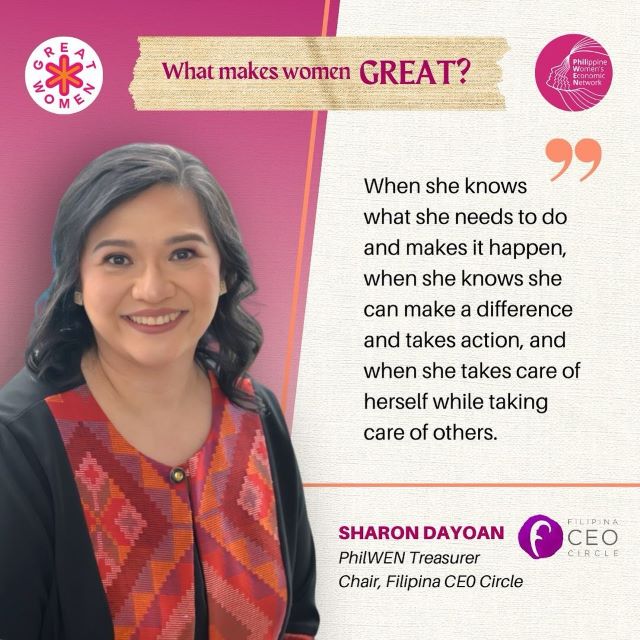
Sharon Dayoan
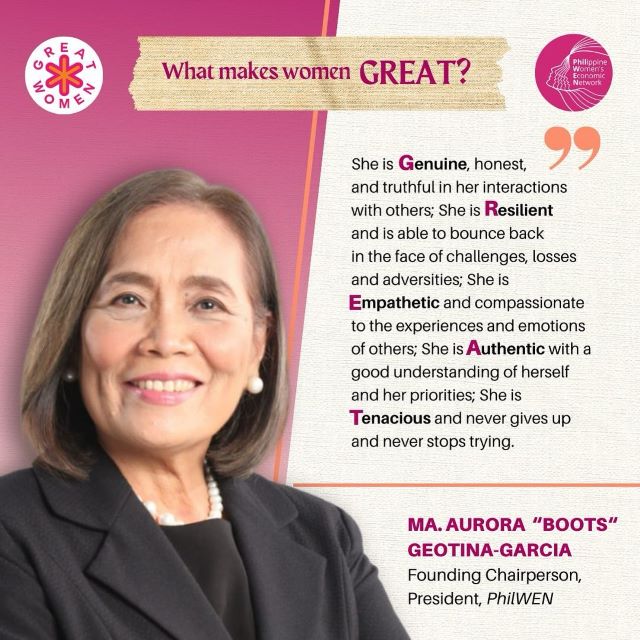
Boots Garcia
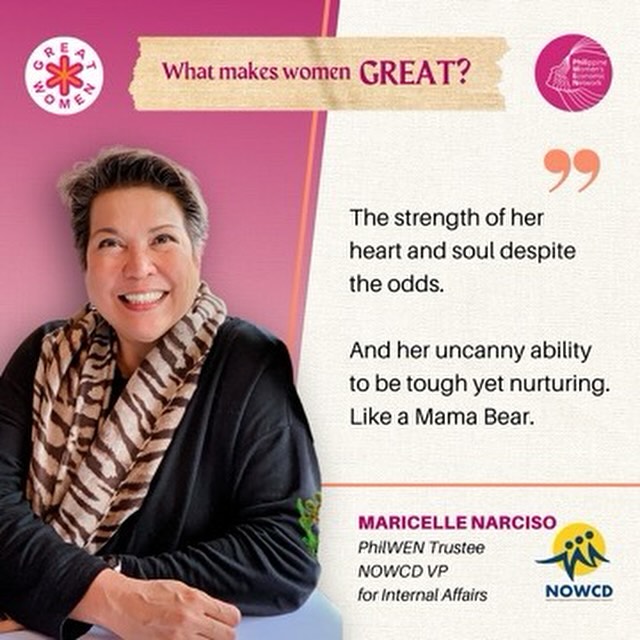
Maricelle Narciso
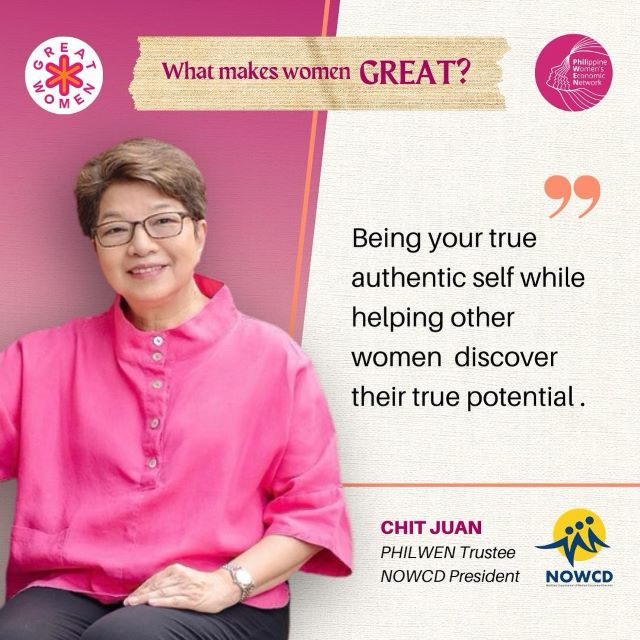
Chit Juan
International Women’s Month Feature: Boots Garcia
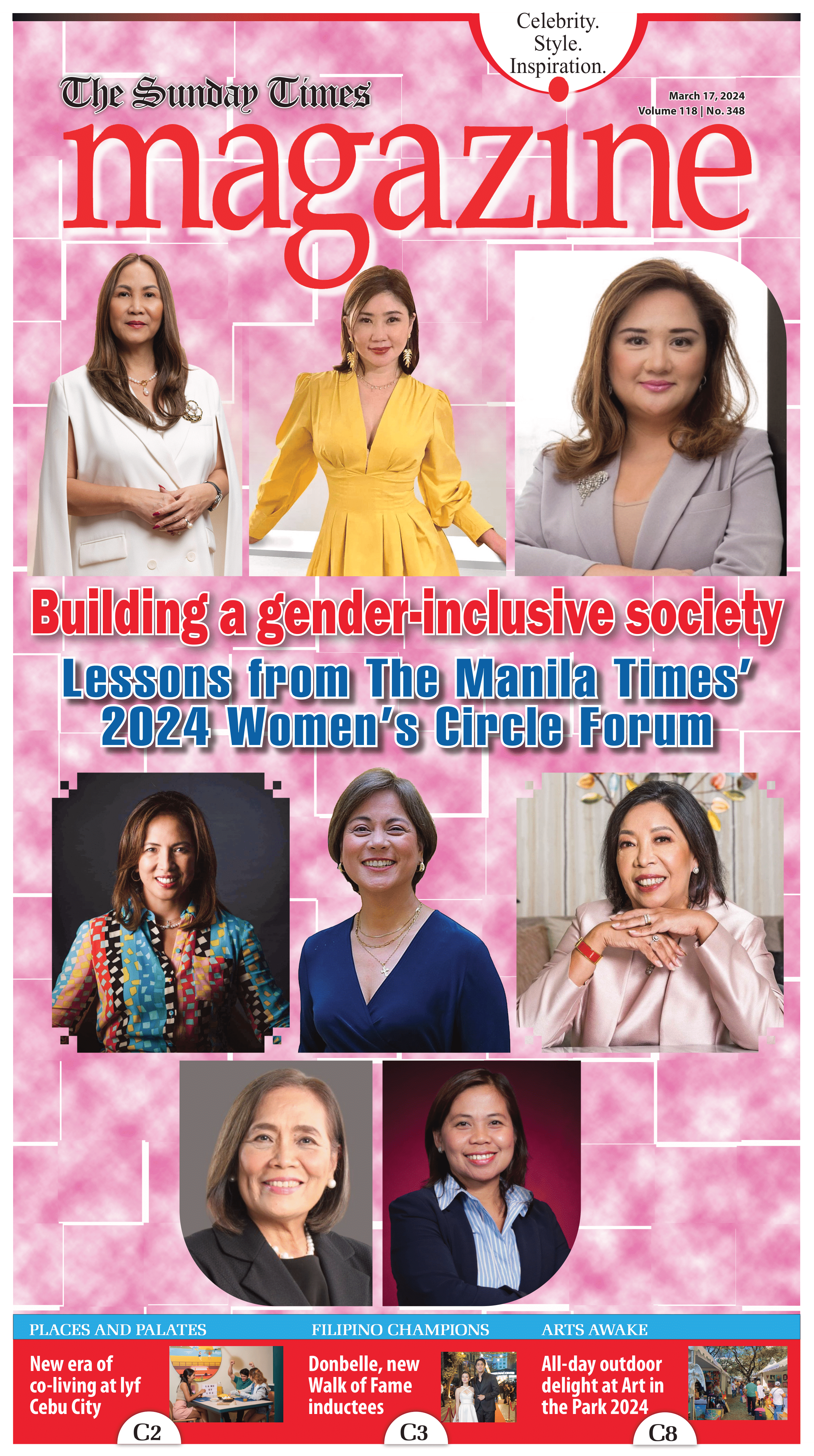
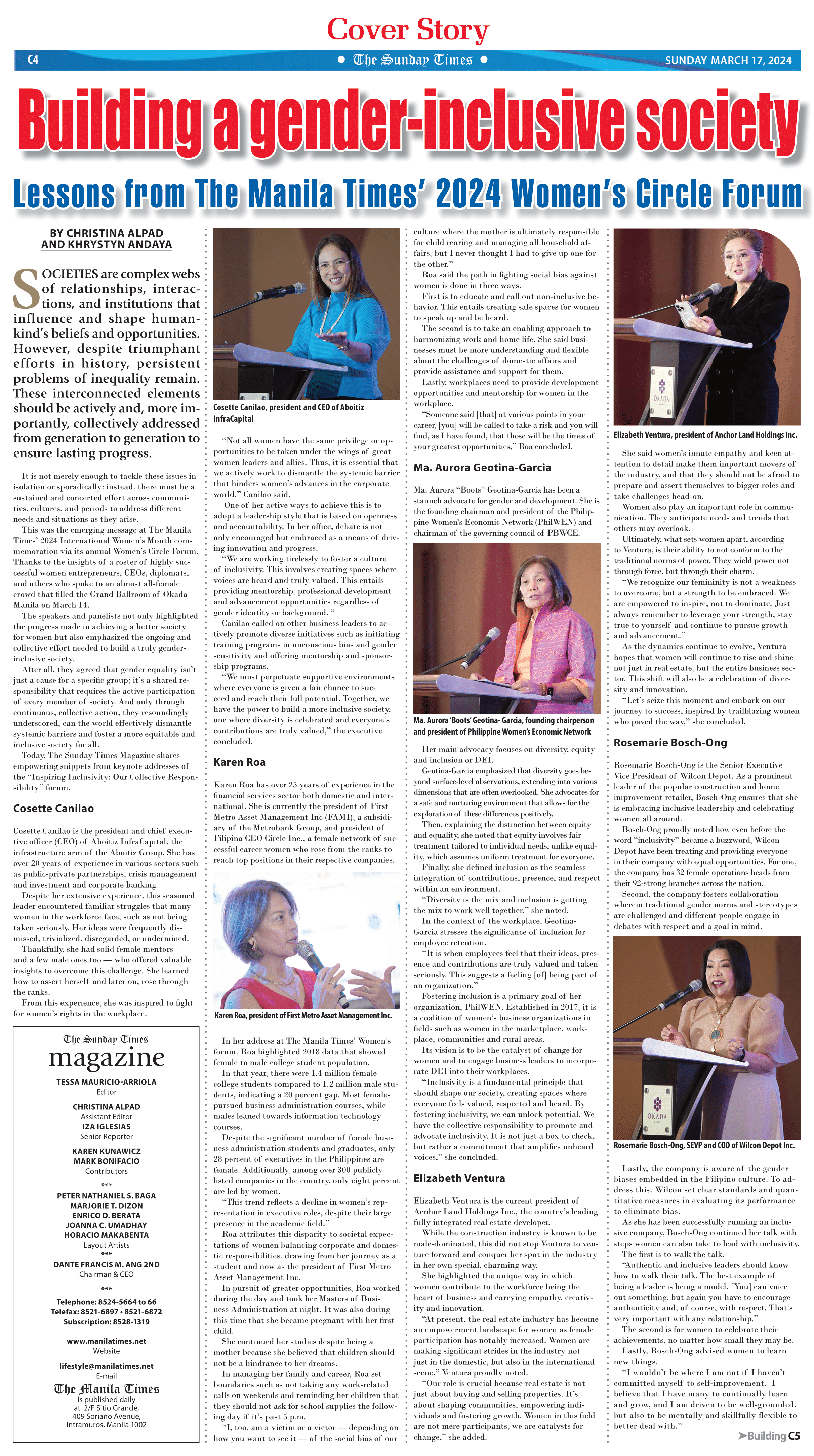
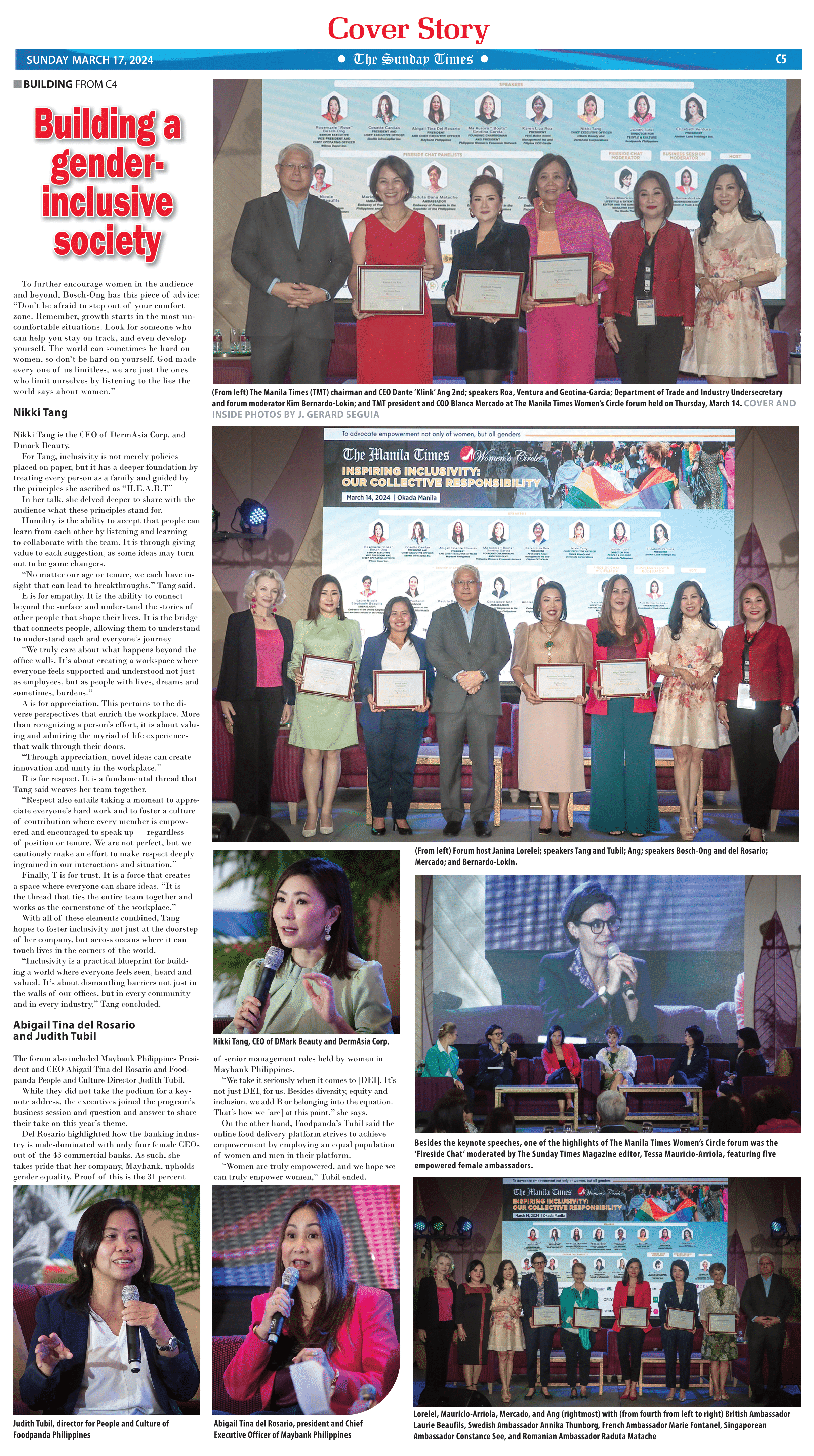
Are Board Directorships Just for the Old and Retired
Looking for an alternative career? Eager to approach retirement? One usually asks these questions as we reflect upon the New Year and what it will bring. Not a few people have asked me: What do I do when I reach retirement age? My reply: You have to keep yourself busy. One of the ways to be busy but not doing the usual 9-to-5 grind is to be a board director. The next question is: But I have no idea about finance or risk management. Well, being a director does not mean you have to be a finance whiz or an audit expert. Directors have to be from varied backgrounds and preferably have had experience in a field which the rest of the Board may not have.
Myth: Directors of Boards have to be old and senior.
Fact: Boards now also look for younger people who may have expertise in technology or media to be able to contribute new thinking to an otherwise old Board.
Myth: You need to be a good auditor.
Fact: Boards prefer to have experts in every field relevant to the business, such as the usual fields like Marketing and Audit, and the new fields like ChatGPT, Artificial Intelligence (AI) or even Cryptocurrency.
Myth: Only men are allowed in Boards.
Fact: Publicly listed company Boards are now made up of 17% women. There even is a global group and institute for Women Corporate Directors (www.womeninboards.com) and a local chapter called NOWCD or NextGen Organization of Women Corporate Directors.
Diversity of members is very much encouraged in Board compositions, not just because global studies show diversity as being one of the secrets to profitability, but also to avoid the danger of groupthink or producing “yes-men” or “yes-women” who rubberstamp a family patriarch’s wishes vs what is good for the company’s sustainability plans. The first diversity marker, on many occasions, is gender diversity. Boards used to be composed of an all-male team in black suits, who served as well-paid directors until they croaked or left only to move to another Board directorship. Yes, this is a job or career path for ex-CEOs, ex-COOs, and ex-government officials because names must be impressive in an annual report.
But the younger set should also investigate training for a Board Director seat. Usually, heirs-apparent are given training by their parents by seating them in company Boards. They listen and learn and soon may take over leadership of the company or conglomerate. What if you were not born with the proverbial silver spoon? No worries. You can hone your skills in a field that is relatively new, as there is a big chance that old male directors have no time to study the ever-changing sector called Digital Technology and the Industrial Revolution 4.0.
Firms who are borrowers of foreign banks and lending institutions, and companies with international joint venture partners also look for a Balanced Scorecard, Environmental, Social and Governance (ESG) as qualities, and will actually require a Board that is diverse in gender, age, and experience. This is an opportunity for younger officers and corporate people to raise their profiles in Linked In, for example, so they can be discovered by headhunters and those looking to refresh their corporate Boards.
When I was asked to serve in a non-profit some 15 years ago, I learned from them as they also learned from my humble experience as an entrepreneur. Sometimes, non-profits have to look at sustainability through an entrepreneur’s eyes and not through a donee’s perspective alone. It also helps to serve in non-profit organizations where you learn from more experienced co-directors who are humble enough to let you speak from your own career or history, and see how your sharing can help the organizations.
It also helps to serve in family boards as members can be more forgiving. Even while you are learning from each other’s mistakes (and sometimes it can cost the family a small fortune), you and the other directors might also miss the mark you have set for yourselves to reach. There can be opportunities lost, but serving as a director gives you a holistic approach to problem-solving and forward planning, even for small family corporations. The only secret is for the head of the family to be open-minded to suggestions and “out of the box” thinking.
I was fortunate to have served on a Board at the young age of 18, listening to how board meetings were conducted and per diems were given. As you learn the other theories in school, you add your practical experience and voila you now can speak up, suggest and train to be a more professional director.
I then enrolled in the Professional Directorship Program (PDP) of the Institute of Corporate Directors (www.icd.ph) where you learn from the masters of governance, and where you get exposed to professional corporate and independent directors. It also helps to attend conferences, such as those of the Global Institutes of the Women Corporate Directors (WCD) which were held in Singapore and Tokyo in pre-pandemic years. During the pandemic, workshops and conferences continued online, to the convenience of all who wanted to further hone their skills in being independent directors without the cost of travel.
Finally, learn to also serve in private boards and wear your independent hat as an astute expert in your field, or even just to give your “two cents” to solve what seems easy to you but seems like an insurmountable challenge to the others. You will be surprised at how exposure and experience (not just formal education) can help you come up with a creative solution to most issues.
Manifest and it will come. But make a conscious effort to open your career to other opportunities. Imagine all the wealth of information a manager like you has gathered over time. Your experience and knowledge can benefit other groups — non-profit, for profit, and even publicly listed companies. And let us change the image of the corporate director — they can be youthful, female, and progressive. Not just another sleepy guy in a black suit.
Chit U. Juan is a member of the MAP Committee on Diversity, Equity and Inclusion. She was AWEN chair from 2016-2018 and is now a PHILWEN trustee and member of AWEN’s Advisory Council. She is also first vice-president of the ASEAN Coffee Federation.
This article first appeared on bworldonline by Chit Juan.
Women Working Together and Why it Matters
I read somewhere that when women support each other, incredible things happen. And I totally relate with this because women—even amazingly powerful women—get so much more guts to raise their hands to try untested propositions when they know they’ve got a tribe of other successful women who have their back.
The Philippine Women’s Economic Network (PhilWEN) recognizes the immense power of harnessing the strengths of women economic organizations under one umbrella. As a coalition of women’s business groups in the Philippines, PhilWEN seeks to amplify the magic of women collaborating with each other to realize its shared advocacy of gender equality, diversity, and inclusion. As a network of women seeking economic empowerment for women in the workplace and in the community, PhilWEN aims to be the catalyst for its member organizations to access funding, training and upskilling, and representation in international fora to become an influential voice of Filipino women.
Today, PhilWEN has five member organizations with a common interest to positively influence the local business landscape to be a safe, inclusive, and equitable place where women can succeed. Individually, each member organization is founded on specific women-oriented economic spheres: women in the marketplace (start-ups, micro, small, medium, and large enterprises), women in the workplace (senior leaders, CEOs, and board directors) across various industries, as well as women in communities (marginalized women in urban and rural communities).
Business and Professional Women BGC welcomes women leaders in the small and medium-sized professional and business enterprises to reach their full professional and leadership potential through networking, skills-building workshops, and seminars.
Filipina CEO Circle (FCC) represents Filipina CEOs who rose from the ranks to become senior corporate leaders in professional services, investments, fashion, infrastructure, technology, health care, and manufacturing. FCC inspires its members through activities designed to fuel their professional growth, passion, and success.Network for Enterprising Women (NEW) provides a platform for aspiring women entrepreneurs to anchor their business growth through right business ethics, networking, and business workshops. It recently partnered with Miriam College to mentor students who aspire to become entrepreneurs through consultations, immersions, and learning sessions with NEW members.
NextGen Organization of Women Corporate Directors (NOWCD) is composed of women board directors advocating for good governance and gender diversity in boards of publicly listed companies and nonprofits. Its mission is to leverage strategic partnerships to increase the number of Filipino women sitting in Philippine board rooms.
SPARK! Philippines focuses on creating equal opportunities for women, especially those who are financially challenged, to boost the country’s economic growth and development. SPARK! recently partnered with the United States Embassy and the Academy for Women Entrepreneurs for training and mentorship for 350 Filipino women.
At PhilWEN, we believe our journey toward achieving our shared advocacy for women economic empowerment needs a united front. Collaborative partnerships to amplify our voice, transparent communication in safe and inclusive environments, and trust are the cornerstones to accelerating women’s economic empowerment in our country.
A perfect regional example. In 2017, we influenced and inspired our sisters from the Asean Women Entrepreneurs’ Network (AWEN) to do the same—create coalitions than work separately on the same advocacies. Thus, AWEN Thailand was formed, Cambodian Women Entrepreneurs Network in Cambodia, AWEN Malaysia, Singapore Women Entrepreneurs Network for Singapore, and the rest will soon follow suit. A coalition of women economic organizations is the best example of working together. After we showed the Philippines’ example, no other way can you show inclusivity among strong women leaders working on empowering the least, the last, and the smallest.
With over 200 members in PhilWEN, we cross ages, skills, years of experience, and a diversity no single organization may achieve. And a bigger reach is achieved with a wider net cast across different demographics. We are grateful to our PhilWEN partners who help us build bridges so every Filipino woman can thrive and be successful. Because truly, when women support each other, magic can happen.
Gender Fair Education
With the recent opening of schools, I was reminded of a significant milestone that took place in September 2015, when 193 countries of the United Nations (UN) General Assembly, including the Philippines, committed to achieving the Sustainable Development Goals (SDGs) by 2030. Among the 17 Global Goals are SDG 4: Quality Education and SDG 5: Gender Equality.
It has been eight years since the SDGs were adopted. The question to ask is are we even there yet?
With reference to the UN’s “The Sustainable Development Goals Report: 2023 Special Edition” which presented a candid assessment of the global progress on SDGs, an estimated 84 million children and young people will still be out of school by 2030 and it will take 140 years for women to be represented in leadership positions. UN cited the COVID-19 pandemic and the war in Ukraine as the major causes that reversed the decades of progress we have so far achieved. Given this, the world is falling far behind in achieving quality education and is not on track to achieve gender equality by 2030.
GENDER BIAS IN FAMILIES
The family, as a primary agent of socialization, is the foundation of values, behaviors, and social development. As a matter of fact, in Filipino culture, the family ranks in the top list of our life priorities. Inadvertently, gender and social norms, such as women being the default caregivers and men as the main financial providers of the family, are being perpetuated at home.
Oxfam’s report entitled “Understanding Norms Around the Gendered Division of Labour” reveals that the concepts of obligation or responsibility and the idea that each household member fulfills a prescribed role contributes to family harmony and unity. As traditional values still dominate our society, families inevitably conform to these expectations and socially accepted norms based on gender to avoid conflicts.
Furthermore, the language and social cues used within families perpetuate gender bias. In the same report, women who did not fulfill care responsibilities were generally perceived in a negative manner, often described as “lazy,” “negligent,” and “untrustworthy.” Therefore, as the report noted, the notion of women not being involved in care responsibilities is unacceptable. In addition, the Women in the Philippine C-Suite Study of the Philippine Business Coalition for Women Empowerment (PBCWE) and the Makati Business Club (MBC) found that, “timing is apparently crucial for women, especially when we recognize that aside from work, they also need to anticipate, plan, and prepare for their child-bearing and child-rearing years or when prioritizing having a family.” Overall, the mindsets and perceptions that children learn at home are carried over in school, and eventually when they pursue their chosen professional careers.
FORMAL EDUCATION
Schools are extensions of a child’s “home,” and therefore, play an important role in eliminating gendered expectations by fostering safe and inclusive learning environments. Materials, such as textbooks and visual aids, are fundamental to learning (and unlearning) gender stereotypes. One of the prevailing examples of stereotypes is the belief that boys are “naturally” gifted in learning technical skills in math and science, while girls are good at livelihood education and literature. This example only further exacerbates the notion that gender is a major determinant of what professions children should pursue, which should not be the case.
Notwithstanding that gender bias still exists, we are seeing gradual changes albeit at a slow pace. Using data from the Philippine Statistics Authority (PSA), the Department of Science and Technology — Science Education Institute (DoST-SEI) reported that there was a 148% increase, from 179,000 in 1990 to 445,000 in 2015, in Filipino women pursuing careers related to Science, Technology, Engineering, and Mathematics (STEM). Females occupy nearly half of the country’s total science and technology workforce, prominently in the health industry, while women in engineering, architecture, and ICT-related fields remain to be under-represented. The under-representation can be attributed to the long-standing metaphor called the “leaky pipeline,” which refers to the decrease in number of female employees as they progress in their careers due to many factors, such as discrimination, lack of role models, gender pay gap, and the outdated idea of job segregation. Insights from the recent Women in Engineering Baseline Study, spearheaded by the Council of Engineering Consultants of the Philippines-Young Professionals Forum (CECOPHIL-YPF), further uncover that while it is believed that opportunities for men are similarly offered to women, factors that are unique to women must be considered — one of the main reasons why there is a need to conduct gender sensitivity trainings in the workplace.
SOLVING PROBLEMS TOGETHER
Education starts at home and therefore, unlearning gender biases must start within families. When people are limited to conforming to obsolete beliefs, it hurts everyone. In a similar manner, academic institutions must hold gender sensitivity training among teachers and learners. In addition, an extensive review of the current curricula must be initiated to ensure that gender bias and harmful norms are removed from learning materials, and one is free to pursue a professional career, regardless of gender. Without a doubt, rendering a more gender-fair environment at home is conducive to achieving success in school and in the workplace.
The likelihood of achieving the global targets outlined in the SDGs is unlikely, but we are not saying that it is impossible. You may ask, what can we do immediately? I believe now is the right time to reverse mindsets and stand up for gender equality at home and in school. Let us start accepting the norm that men should have an active role in doing care work, and that it is normal for women to provide for the family. As they say, if not now, when?
I would like to end by sharing an African proverb, “If you educate a man, you educate an individual. But if you educate a woman, you educate a nation. When girls are educated, countries become stronger and more prosperous.”
(This article reflects the personal opinion of the author and does not reflect the official stand of the Management Association of the Philippines (MAP).)
Ma. Aurora “Boots” D. Geotina-Garcia is a member of the MAP Committee on Diversity, Equity and Inclusion. She is the founding chair and president of PHILWEN. She is also chair of the Governing Council of the PBCWE and president of Mageo Consulting, Inc., a corporate finance advisory services firm.
Hot Flat World
If you have read Thomas Friedman who started with a flat world (The World is Flat, 2005) then followed it up with the sequel on how we should green the world (Hot, Flat and Crowded, 2008), that was a good 15 years ago. And today, listening to Lopez Group chairman Federico “Piki” Lopez speak, we are in big trouble. Our world is hotter and only a conscious effort to rebuild, renew and regenerate our planet will save it from burning out.
We had Mr. Lopez at the annual membership meeting of the Nextgen Organization of Women Corporate Directors (NOWCD) and he talked about REGENERATION. “Sustainability alone is not enough,” he shared. The power of billions of people to bring this world to hotness can be the same power to regenerate it. The solution really sounds simple, if we all make the effort.
Who wants to live with floods and heat waves, forest fires and tsunamis? We definitely do not want to. And the way to do it is really to avoid the use of coal and start going electric. But electricity must also be from greener sources like solar, wind and hydropower if we are to enjoy its benefits. And first and foremost is to make businesses think about how to be green and still be profitable.
We are now in a good place to convert to renewable sources of energy. There is an array of electric vehicles and hybrid cars available, albeit still with a steep price. There also is the seemingly disposable electric tricycle, because its battery replacement cost is almost the same as the cost of a complete brand new unit.
As early as 15 years ago, we had a campaign called “Live Green” and we gave talks on the use of CFLs (now LEDs) instead of fluorescent lamps, the use of power strips which you could turn off rather than have all your appliances on the “wait” mode, consuming power even when not in use. We also started adopting the use of inverter appliances like air conditioners. Today, technology has inverter models of washing machines, power drills and other equipment. There is no reason not to change over to inverter and power-saving versions of household staples like air conditioners.
Today, making green choices is easier than ever. There are solar lamps and chargers for household lights, security lamps and solar versions of almost every appliance. Thanks to the lowering of prices of photovoltaic (PV) cells, we also now have a lot of solar farms, gathering electricity at lower costs than coal. These solar farms sell back the power to the grid, adding to our reduced dependence on fossil fuels as a country.
The other activity we all must do is to reforest, replant and regenerate our farms. Did you know that there is a law requiring every able-bodied Filipino 12 years and older to plant one tree a year? I had the most interesting conversation with a learned public servant who is a forester and a CENRO or Community Environment and Natural Resources Office head. He told me more about free seedlings the Department of Environment and Natural Resources (DENR) is giving away. I was able to get a Narra seedling from the event I attended in Laguna. Apparently, DENR distributes these for free as they are replacement of trees coming from areas with tree cutting permits. For every tree cut, 50 seedlings replace the cut tree. For naturally growing trees, the replacement is 100 seedlings. All one has to do is to visit a DENR office and ask for a seedling.
Besides these free seedlings, we at the Coffee Board (www.philcoffeeboard.com) also have a program with GCash to plant coffee trees all over the country. So I asked my new consultant if they could help us source shade trees. Coffee seedlings need shade in their early stage. In Benguet they use native alnos or pine, and in Cavite they use madre de cacao.
It is really enriching to talk to foresters who mean well and who further added that he is recruiting young graduates who can continue work he has started to reforest our lands. Now that’s a good example of someone thinking of the next generation already, even before his retirement. His team was just as interested in the dispersal of seedlings and showed their love for their work…on a Saturday, too. It is rare to have government people work on weekends, but this group was in their uniforms, ready to help consumers like myself by answering many queries I had.
For example, why do we distribute mahogany seedlings when we know that its leaves are acidic to the soil and that they are not indigenous to our forests? They cleverly answered that distribution of mahogany is allowed IF it is for production and not for reforestation. Clearly, they do not recommend mahogany to be planted just anywhere but purely for production purposes (imagine a manufacturing plant for wood) as it is harmful to animals and for biodiversity in general. Now, that is an intelligent clarification I truly appreciated.
So for your community, family or company, you can partner with an organization like GCash and Coffee Board to plant your tree, anywhere in the country. You may also volunteer to dig holes, spend a day in the warm sun and get your Vitamin D. We will work with the CENRO, PENRO (Provincial Environment and Resource Office), the farmers’ groups to get your trees planted and maintained. With today’s available technology like drones, GPS and satellites or similar monitoring equipment, we can see these trees through their infancy to adulthood.
As Mr. Lopez shared, we have to now regenerate and reforest. Planting a tree (the correct species) is the simplest, best thing anyone can do. Imagine 100 million trees a year. Now that can make our country cool in no time. And reap other benefits of regeneration. A cooler world for all.
First appeared on Philstar by Chit U. Juan
Directors’ Duties on Climate Change
By: Atty. Euney Marie Mata-Perez on September 14,2023
I was just inducted as a member of NOWCD, the NextGen Organization of Women Corporate Directors, the Philippine chapter of Women Corporate Directors International.
Incorporated on September 24, 2021, NOWCD seeks to bring together a trusted community of experienced and engaged directors across the Philippines, looking to continue to increase representation of women across publicly- and privately- held boards, from 17% to 23% by 2025. The organization is driven by the belief that diversity and representation is central to ensuring success for any organization.
At the induction, Mr. Federico “Piki” Lopez, the Chairman and Chief Executive Officer of First Philippine Holdings Corp (FHPC), as the speaker, shared his very interesting and relevant thoughts about climate change, under the FPHC’s mission to “foster collaborative pathways for a decarbonized and regenerative future”.
His talk spurred interest and awareness to the NOWCD members on the obligations of directors with respect to climate change. This led me to review the legal opinion entitled “Directors’ Duties & Responsibilities and Disclosure Obligations Under Philippine Law On Climate Change Risks” (the “Opinion”), which was published by the Commonwealth Climate and Law Initiative (CCLI), together with ClientEarth and the Institute of Corporate Directors. The Opinion was authored principally by my esteemed law school professor, Atty. Cesar Villanueva.
It is hoped that the Opinion will lay the basis for our regulators to formally adopt rules which outline directors’ duties with respect to climate change. This article will briefly summarize the contents of the Opinion in light of directors’ legal and fiduciary duties.
- The Philippines’ 1987 Constitution recognizes the citizens’ “right to health” and “right to a balanced and healthful ecology”. The Supreme Court has affirmed this right in the case of Oposa v. Factoran, G.R. No. 101083, 20 July 1993.
- The Constitution, while guaranteeing the principles of private ownership, also decrees the “social function of private property and economic enterprises”, and, in this regard, provides that “the use of property bears a social function and economic agents (which include corporations) should contribute to the common good”.
- The foregoing means that the fiduciary duties of directors of “for-profit” corporations of obedience and diligence, not just to the shareholders but to other stakeholders, as well their duty to abide by the rules of good governance, “include within the scope of responsibility a stewardship role to ensure that company operations do not degrade the environment or contravene environmental laws”.
- It recognized that the Climate Change Act (Republic Act No. 9729), while providing opportunities where private sector may have the opportunity to fulfill their social responsibilities towards meeting climate risks, does not define or impose an institutional responsibility on the private corporate sector to address climate change beyond the legal parameters set out in our environmental laws.
- However, under Section 30 of the Revised Corporation Code (RCC), directors can be personally and solidarily liable with the corporation for “willfully and knowingly assenting to patently unlawful acts of the corporation” or at least for “gross negligence or bad faith in directing the affairs of the corporation”. In this regard, the Opinion states that, while prohibited acts under various environmental laws provide limited areas where directors may be held criminally liable, Section 30 of the RCC can provide legal basis for such a liability especially “when the commission of such prohibited acts is egregious”.
- Directors also have the duty to ensure that material climate change issues should be properly disclosed. The RCC includes certain duties of directors to “inform or disclose” to shareholders material or relevant information relating to corporate transactions.
- Under the Securities and Exchange Commission’s Code of Corporate Governance, publicly-held companies are mandated to ensure that material and reportable non-financial and sustainable issues are disclosed.
- The Philippine Stock Exchange disclosure rules require publicly-listed companies to disclose any material fact which may materially affect investor’s decisions, which would include disclosure on climate-related risks.
If shareholders are able to prove that a director’s failure to identify and monitor climate change risks constitute a breach of their fiduciary duties, a derivative suit may be filed against erring directors.
- The Opinion did state that under the current disclosure rules for publicly-listed companies which adopt the “complain or explain” approach, the obligation to disclose and submit the sustainability report, including material climate-change disclosures, is primarily a corporate responsibility. Thus, directors are not directly and personally liable for corporate disclosures, unless they make false or misleading statements of material fact in required SEC filings which are tantamount to “market manipulation” or “fraudulent transactions”, under the Securities Regulations Code.
In summary, the emerging role of directors in addressing climate change includes, not just the duty to refrain from harming the environment based on the “prohibited” acts which may be imposed under existing laws, but also includes the directors’ stewardship over the company’s long term success with due regard to climate change risks.
Euney Marie J. Mata-Perez is a CPA-Lawyer and the Managing Partner of Mata-Perez, Tamayo & Francisco (MTF Counsel).
The Secret Sauce to Profit
By Chit U. Juan
When one thinks of a company’s sustainability, usually we just think of the business case, especially for micro-, small- and medium-sized enterprises (MSMEs). How profitable is the business? How sustainable is the model? But do we also give some thought to what makes companies last?
A study on Publicly-Listed Companies (PLCs) in the Philippines was launched by the Institute of Corporate Directors (www.icd.ph), led by its Board Diversity and Inclusion (BDI) Committee Chair Helen de Guzman and Dr. Conchita Manabat. It revealed that diversity in boards does contribute to a positive return on equity (ROE).
While the Philippines reported on having more women in boards as a key development, two other ASEAN member-states contributed their studies at the forum: The Singapore Institute of Directors (SID) and the Institute of Corporate Directors Malaysia (ICDM). It was a welcome realization that there are striking similarities among the three institutions’ findings.
Diversity is often thought of as having women on boards, because the traditional composition of boards are men in dark suits, usually the family patriarch and his sons. But the ratios of women and men are no longer the only measure of diversity. Here are other factors mentioned by the speakers:
1. Age. Although having seniors and a higher average age (at 62-65 years old range) on boards is recommended, this means having more than one generation at the table. They recommend a 15-year difference or getting Baby Boomers, Millennials, and Gen Z together to reach this sweet spot of average age recommendation.
2. Skills and Expertise. There must be a variety of specialties, not just business management or financial prowess. In today’s age of technology, experts in other disciplines make a board more agile to respond to today’s challenges.
3. Tenure. The Singapore experience emphasized a maximum term of nine years for a board independent director, and a board composition where three members are new every three years. This, of course, presumes a board of nine or more members.
The ICDM also shared that they have a pool of over a thousand candidates, including first time directors, whose expertise in a field may be useful to most old companies who want to be in step with new trends in business. This pool may be what we need and will be addressed by our organization, the NextGen Organization of Women Corporate Directors (www.nowcdphils.com) who will now invite C-suite women to think of corporate directorship as a career move.
We have a NOWCD member who was recruited by surprise because of her experience in retail. She had never been an independent director until recently. And she brings to the table her vast experience in specialty retail. Another member sits on an Advisory Board of one of our Armed Forces. She brings marketing expertise to an otherwise traditional service organization, whose work is never appreciated because the public does not know what they do. So, these are examples of women who are recruited to join boards for their expertise in their field (e.g., Marketing, Retail, etc.). It also counts a lot that they are women, because the sweet spot for boards to be profitable is to have a 50:50 ratio as observed by the Singapore Institute experience.
In the same forum, however, a gentleman reacted about having women, pushing women all the time. The panelists then explained that there are other dimensions to diversity but that having women seems to be the most popular in the Philippines as traditional companies do tend to have all-male boards. Even to us ICD fellows, we found new ideas in what Mr. Shai Ganu of SID shared. It is not just diversity in gender. The other factors are: age, tenure, board independence, cultural ethnicity (especially in international companies), international experience, domain or functional expertise, and industry expertise.
For functional expertise, the speakers suggest more than five areas of expertise in a board to prevent groupthink. So, this also means Independent Directors need not be only business and finance experts; there is room for diverse persuasions like marketing, technology, retail experience, sustainability expertise and maybe even experience in a relatively new field like blockchain and cryptocurrency, AI and ChatGPT.
Other tips from Mr. Shai Ganu: Conform, Perform and Transform. This means that Board directors must help in addressing legal issues, moral issues, and, of course, business issues. The role of the Board is increasingly focused on three areas: Conformance, Performance, and Future-Proofing the company.
The ICD did well in inviting Michelle Kythe Lim of ICDM to give another ASEAN perspective, and this time suggesting that even first-time directors must be encouraged to contribute their expertise even if they do not yet have the experience of serving on Boards. They gather over a thousand candidates ready for deployment as subject matter experts, and many are in new fields of expertise. In yesteryears, we always thought board seats were reserved for finance experts, business management experts and auditors. Not anymore. Today, we need diversity in age, gender, and even international exposure or experience.
With ICD giving the Professional Directors Program (PDP) and NOWCD gathering more women, Philippine PLCs will very soon have a good selection of candidates to season their otherwise traditional boards. And C-suite professionals may find a career after retirement or even as an alternative route while still young and employed. This could be a side hustle in the terms of today’s youth, and a learn-while-you-earn kind of move for most subject matter experts.
Remember the points raised by Shan Ganu and test your board composition against it. It will be fun looking for new directors and giving your company a jolt to adapt to the future.
Chit U. Juan is co-vice chair of the MAP Environment Committee and is a member of the MAP Diversity, Equity and Inclusion Committee. She is president of NOWCD and chair of the Philippine Coffee Board, and a councilor of Slow Food for Southeast Asia Advocate for organic agriculture.
Directors’ Duties on Climate Change
By: Atty. Euney Marie Mata-Perez
I was just inducted as a member of NOWCD, the NextGen Organization of Women Corporate Directors, the Philippine chapter of Women Corporate Directors International.
Incorporated on September 24, 2021, NOWCD seeks to bring together a trusted community of experienced and engaged directors across the Philippines, looking to continue to increase representation of women across publicly- and privately- held boards, from 17% to 23% by 2025. The organization is driven by the belief that diversity and representation is central to ensuring success for any organization.
At the induction, Mr. Federico “Piki” Lopez, the Chairman and Chief Executive Officer of First Philippine Holdings Corp (FHPC), as the speaker, shared his very interesting and relevant thoughts about climate change, under the FPHC’s mission to “foster collaborative pathways for a decarbonized and regenerative future”.
His talk spurred interest and awareness to the NOWCD members on the obligations of directors with respect to climate change. This led me to review the legal opinion entitled “Directors’ Duties & Responsibilities and Disclosure Obligations Under Philippine Law On Climate Change Risks” (the “Opinion”), which was published by the Commonwealth Climate and Law Initiative (CCLI), together with ClientEarth and the Institute of Corporate Directors. The Opinion was authored principally by my esteemed law school professor, Atty. Cesar Villanueva.
It is hoped that the Opinion will lay the basis for our regulators to formally adopt rules which outline directors’ duties with respect to climate change. This article will briefly summarize the contents of the Opinion in light of directors’ legal and fiduciary duties.
- The Philippines’ 1987 Constitution recognizes the citizens’ “right to health” and “right to a balanced and healthful ecology”. The Supreme Court has affirmed this right in the case of Oposa v. Factoran, G.R. No. 101083, 20 July 1993.
- The Constitution, while guaranteeing the principles of private ownership, also decrees the “social function of private property and economic enterprises”, and, in this regard, provides that “the use of property bears a social function and economic agents (which include corporations) should contribute to the common good”.
- The foregoing means that the fiduciary duties of directors of “for-profit” corporations of obedience and diligence, not just to the shareholders but to other stakeholders, as well their duty to abide by the rules of good governance, “include within the scope of responsibility a stewardship role to ensure that company operations do not degrade the environment or contravene environmental laws”.
- It recognized that the Climate Change Act (Republic Act No. 9729), while providing opportunities where private sector may have the opportunity to fulfill their social responsibilities towards meeting climate risks, does not define or impose an institutional responsibility on the private corporate sector to address climate change beyond the legal parameters set out in our environmental laws.
- However, under Section 30 of the Revised Corporation Code (RCC), directors can be personally and solidarily liable with the corporation for “willfully and knowingly assenting to patently unlawful acts of the corporation” or at least for “gross negligence or bad faith in directing the affairs of the corporation”. In this regard, the Opinion states that, while prohibited acts under various environmental laws provide limited areas where directors may be held criminally liable, Section 30 of the RCC can provide legal basis for such a liability especially “when the commission of such prohibited acts is egregious”.
- Directors also have the duty to ensure that material climate change issues should be properly disclosed. The RCC includes certain duties of directors to “inform or disclose” to shareholders material or relevant information relating to corporate transactions.
- Under the Securities and Exchange Commission’s Code of Corporate Governance, publicly-held companies are mandated to ensure that material and reportable non-financial and sustainable issues are disclosed.
- The Philippine Stock Exchange disclosure rules require publicly-listed companies to disclose any material fact which may materially affect investor’s decisions, which would include disclosure on climate-related risks.
If shareholders are able to prove that a director’s failure to identify and monitor climate change risks constitute a breach of their fiduciary duties, a derivative suit may be filed against erring directors.
- The Opinion did state that under the current disclosure rules for publicly-listed companies which adopt the “complain or explain” approach, the obligation to disclose and submit the sustainability report, including material climate-change disclosures, is primarily a corporate responsibility. Thus, directors are not directly and personally liable for corporate disclosures, unless they make false or misleading statements of material fact in required SEC filings which are tantamount to “market manipulation” or “fraudulent transactions”, under the Securities Regulations Code.
In summary, the emerging role of directors in addressing climate change includes, not just the duty to refrain from harming the environment based on the “prohibited” acts which may be imposed under existing laws, but also includes the directors’ stewardship over the company’s long term success with due regard to climate change risks.
Euney Marie J. Mata-Perez is a CPA-Lawyer and the Managing Partner of Mata-Perez, Tamayo & Francisco (MTF Counsel).
Women on boards revolutionizing ESG governance
By: Ma. Aurora “Boots” D. Geotina-Garcia - Inquirer.net
Last May 6, I had the privilege of speaking at the Global Summit of Women in Dubai on the role of women on boards in promoting environmental, social, and governance (ESG) practices. The session highlighted the importance of diverse board memberships, and I was able to share our best practices—the efforts made in the Philippines—to improve gender parity in corporate governance. It was an opportunity for all of us to explore innovative ESG initiatives that work for our respective contexts.
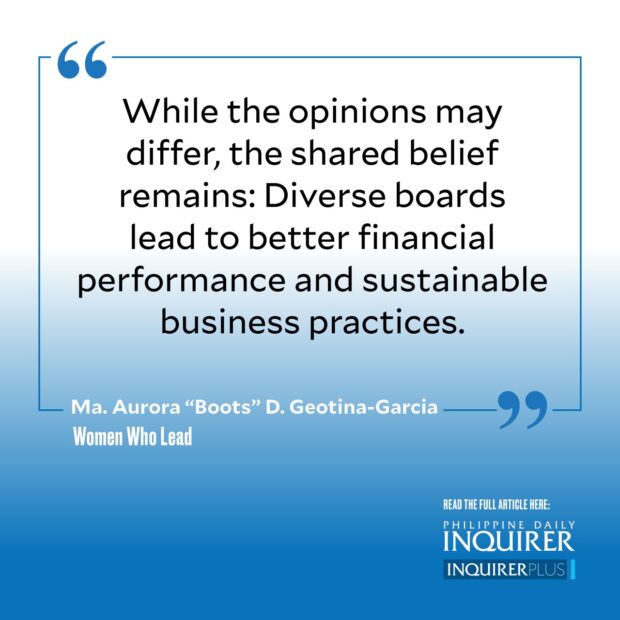
Boots Garcia and Baby Nuesa at the ICD Climate Change Conference last April 27
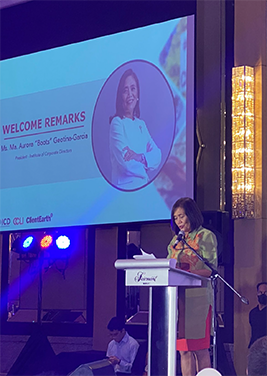
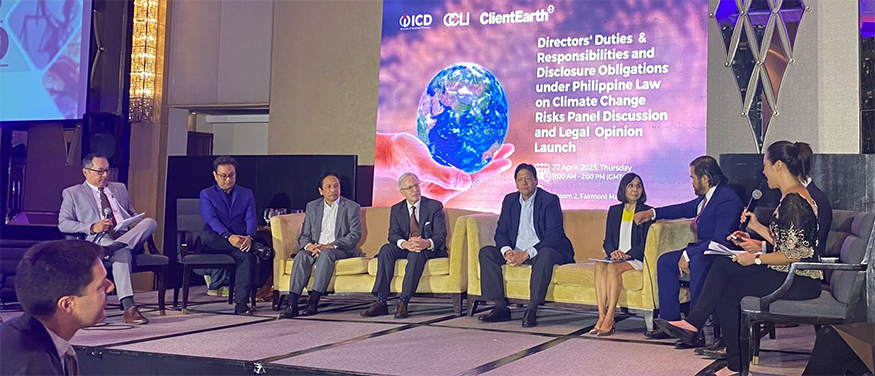
Mariana Zobel de Ayala topbills STAR’s She Slays 2023
Published in Philippine Star
MANILA, Philippines — Women leaders and changemakers will headline The Philippine STAR and PhilStar Life’s She Slays 2023 tomorrow at the Samsung Hall of SM Aura.
Now in its third year and the first to be held in-person, She Slays is back, all leveled up and raring to deliver its biggest, most exciting FestiGal yet…
As this year’s Women’s Month ends, the event is expected to be a huge celebration, one that befits every woman, with no less than the trailblazing Mariana Zobel de Ayala.

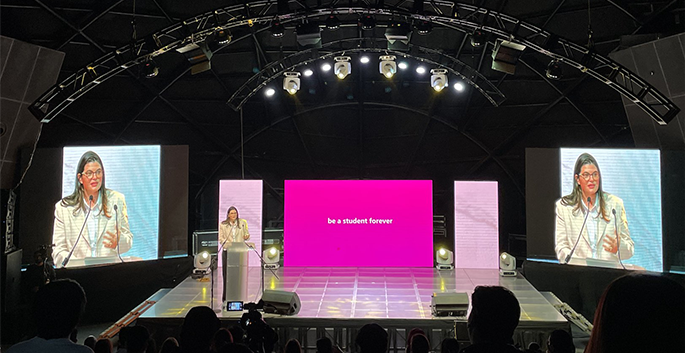
Lazada shows support for women empowerment with adobo SheCreative Leadership Conference “Women Arise”!
Published in Adobo Magazine
MANILA, PHILIPPINES — In just a few days, adobo magazine will be holding its first SheCreative Network Leadership Conference “Women Arise!” at Shangri-La The Fort, BGC on Tuesday, March 28. The event will celebrate National Women’s Month, and will be heralded by today’s most powerful women leaders across the fields of marketing, media, and creative communications…
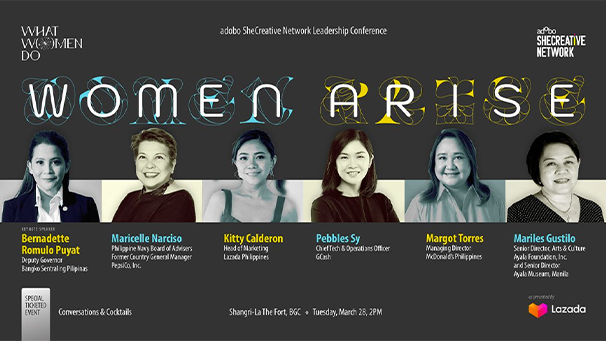
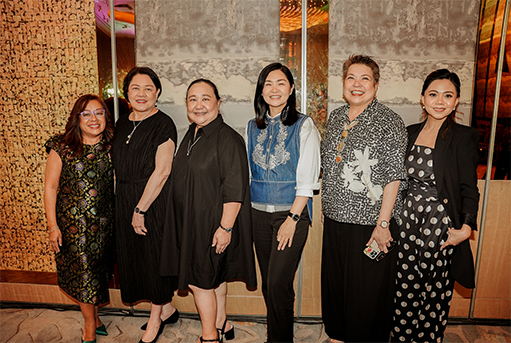
![]()
Is there a business case for Board Diversity?
By: Ma. Aurora “Boots” D. Geotina-Garcia - BUSINESSWORLD
Despite the many studies from different countries on the benefits of board diversity — with at least 90 (and counting) all pointing to a correlation between more women on boards and companies’ better financial performance — there remains skepticism or hesitancy among organizations on adopting policies to make their boards more diverse, and not only in gender, age, and skills, among others. Thus, in my gender equality and women’s economic empowerment advocacy work, I am often asked: “Is there a business case to be made for board diversity?”

Participation of Ms. Boots Garcia in London
with Ambassador Jon Lambe UK Ambassador to ASEAN who supported promoting gender equality, women's leadership, and empowerment.
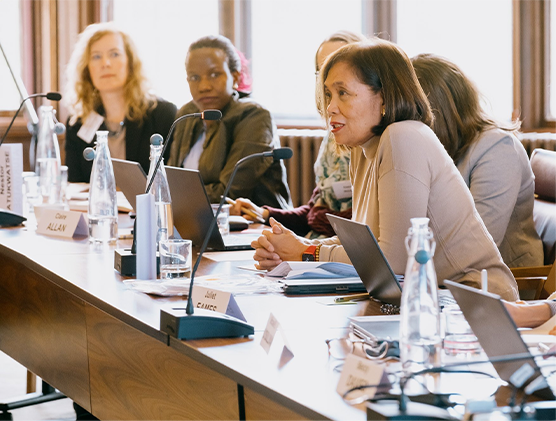
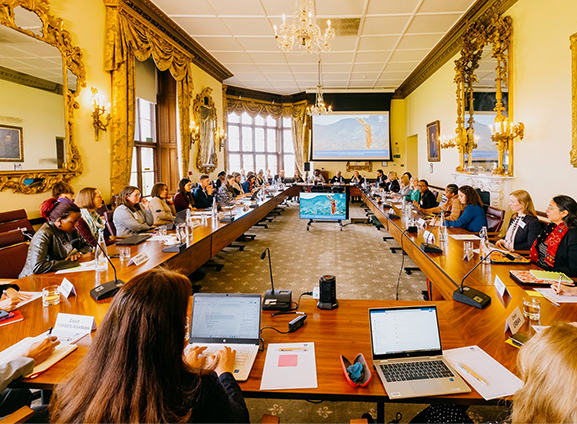
One News interviews Ginbee Go on the inclusivity of women in today’s society
In celebration of National Women's Month, Ginbee and the Philippine Commission on Women's (PCW) Deputy Executive Director Kristine Balmes talk about an inclusive society for women in today's episode of Agenda.

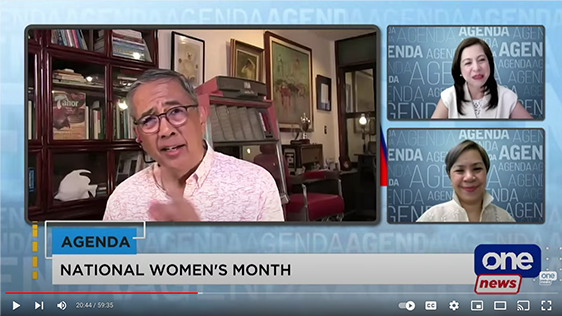
Bridging the digital gender divide
By: Ma. Aurora “Boots” D. Geotina-Garcia
As a coalition of women’s business and advocacy groups, we clearly see that technology is shaping our future and transforming our economies. Thus, we need to work toward accessibility and inclusivity of technology, which combines the two themes of IWD and UN Women.
Last month, I had the privilege of speaking at the Asia-Pacific Regional Consultation on the priority theme for the 67th session of thte CSW 67. It was a productive and collaborative process, which gives me confidence that our shared goal is within our reach—as long as we work together.
Allow me to share some thoughts I shared during the consultation.
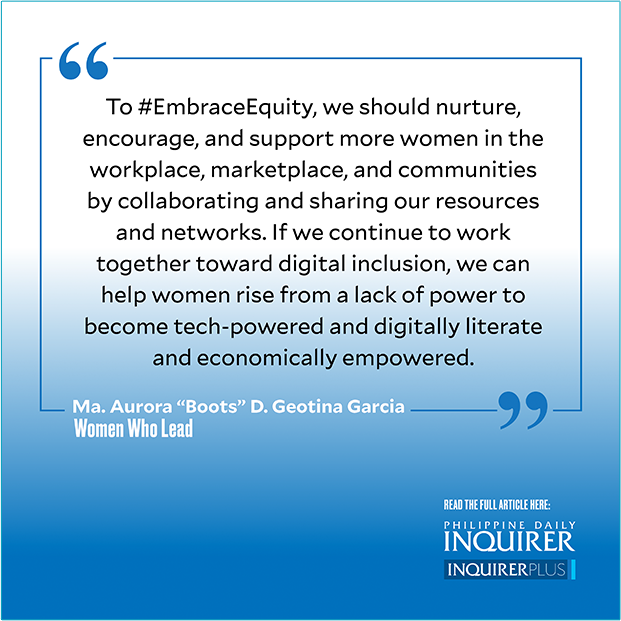
Why March is Women’s Month
By: Chit U. Juan
“It will take over 200 years for women to be at par with men,” a news report from Davos said. Now, that’s “encouraging” (I hope you realize I am being sarcastic). But when we talk about equality, there really is much to do in the gender equality side. Why? Because sometimes it is the women who prevent other women from rising up. Sometimes it is other women who think women are lesser mortals. And oftentimes it is women who think we cannot do what men can do. So there are jobs that are “panglalaki” (meant for men) and “pambabae” (meant for women). And we as a society have long accepted these differentiations.

What Diversity brings to the party
By: Maricelle Narciso
Diversity has become much of a hot topic these days, and for good reason. It is important to understand how this affects organizations and businesses. However, diversity is not just about gender. It is also about age, professional expertise and experience, ethnicity, educational background, regional provenance, or even family background. The “diversity recipe” is also about inclusivity—persons with disabilities, indigenous people, members of the LGBTQ+ community, and people of different faiths—so that we are able to truly represent the population, and be sensitive and considerate of the variety of options we offer to meet their needs, wants, and dreams in terms of service or product.

Why women CEOs are leading in the food and beverage space
By: Christine Cruz-Clarke
Women CEOs are rising through the ranks in the food and beverage space—and, of course, it’s a trend we’re thrilled to see. More and more women are taking on leadership roles, many of whom are self-made hustlers in the traditionally male-dominated realm of food and beverage.
That said, there’s a reason for the rising success of women in this space. Particularly since women have long been excluded from contributing to the industry, they come equipped with a fresh perspective, innovative ideas, and the motivation—and passion—to seamlessly turn complicated concepts into reality. In short, women in the food and beverage space are inspiring positive change in a number of different ways, and this is only the beginning of what’s in store.
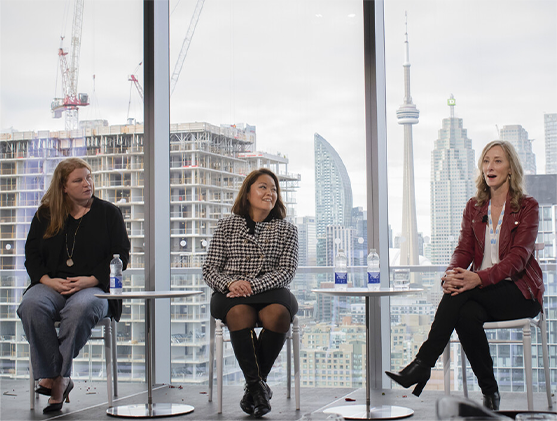
Women of Substance
By: Chit U. Juan
When I meet young girls who seem to be looking for mentors and inspiring modern-day idols, I tell them to attend events of women organizations like the Philippine Women’s Economic Network (PhilWen). The coalition is composed of five active women groups involved in business: the Filipina CEO Circle, the NextGen Organization of Women Corporate Directors or NOWCD, SPARK, the Network for Enterprising Women (NEW), and Business and Professional Women (BPW). Because it is Women’s Month, it may be a good time to focus on directing our younger women on career paths and business options.
What are the most important findings a young woman must remember?

